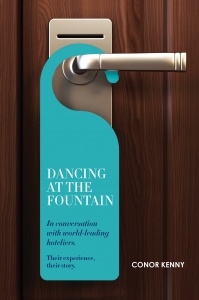Luc Delafosse: My first big step27 September 2016 | Admin Luc Delafosse, interviewed when he was general manager of Hotel de Crillon, Paris, talks about his start in the hotel industry: So when I was about 15 years old, I went to the École Hotelier de Poligny in Jura, and I ended up being there for three years. I loved hotel school. I wanted to work alongside my studies so I used to work in a lot of small restaurants, hotel restaurants, in the whole of Jura. I started as a chef at the same time as attending hotel school, in a hotel in a very small village called Bonlieu in Jura. The name of the hotel was Hôtel Auberge de la Poutre – it is still open today for the season – and the name of the owner, the chef / owner, was M. Denis Moureaux. Although I was working as a chef, sometimes I waited on tables as well if there were too many guests – I did a little bit of everything in that small hotel. I worked at the weekends, during the holidays and so on. In fact, I worked for three years on and off and when I finished up at school, I did the ‘season’, the summer season. During that time, there was a family on holiday in that small village from Monaco, Monte Carlo. The old man – he was old to me at that time, I was very young, maybe 19 – used to come every day to have his coffee at the bar with his newspaper and then two or three days in the week he used to come for lunch or dinner. By the end of the summer, he was good friends with M. Moureaux and he said, “This young man (meaning me), he is fantastic. You should do something with him. You should send him somewhere where he could learn and make some progress”. The old man – his name was M. Accatino – had been the restaurant manager until 1945 of the Empire Room at the Hôtel de Paris in Monaco, Monte Carlo. So my boss said, “M. Accatino, if you say so, why don’t you do something for him? Because he needs to go at the end of the season”. And M. Accatino said, “OK”. I still remember seeing him picking up the telephone, calling Monaco, Monte Carlo from Bonlieu, and asking to speak to M. Pastor. “M. Pastor, how are you? I am on holidays in Jura. I have a fantastic young man for you. Do you think you can employ him as a commis waiter? In September? OK, OK, yes, good, I’ll speak to you later. Thank you very much”. And he looked at my boss and at me and said, “Done!”. So after the season ended, I arrived in Monaco, Monte Carlo. I had the name of the manager and the name of the hotel: M. Pastor, Hôtel de Paris. I was 20 years old. I took a taxi from the station to the hotel and I was so afraid getting out of the taxi with my suitcase. I said, “I am here to see M. Pastor” and so they sent me to the office and there I met M. Pastor. “Ah, here is the young man coming from M. Accatino”. He called somebody else and said, “Please, take care of him” and that was how I started as a commis waiter at the Hôtel de Paris, in Monaco, Monte Carlo. In those days, you had to start at the lower levels in the industry. There was a fantastic brigade at the Hôtel de Paris, a brigade of 50 people – commis waiters, chefs de rang, headwaiters and managers – between the Empire Room and the Grill on the eighth floor. I started as a wine commis, and then I moved onto commis de suite. As a commis waiter, you assist your chef de rang to bring all the dishes from the kitchen to the waiter-station but you are not allowed to go near the table with the guests at that stage still: you have to learn. Then I learnt to be a commis de tranche – that’s when you learn all the skills of carving: flambée and so on. If you were a good commis, after one or two years you could become a chef de rang and for all the commis as I was that the prime objective – your white bow tie would change to a black bow tie to signify your promotion! But in most cases, people were promoted to chef de rang only after maybe five, six or seven years of being a commis. That was the old days – some people would argue against the system but for me it was the very good old days. I spent almost two years at the Hôtel de Paris, leaving only because I had to do my military service, back in Paris. What I had learnt, working in a brigade like that, were very strong values: of hard work, of friendship, of engagement, of parole, when you give your word to your colleagues. A brigade is like a family. Extracted from DANCING AT THE FOUNTAIN: CONVERSATION WITH WORLD-LEADING HOTELIERS by Conor Kenny. |
|

